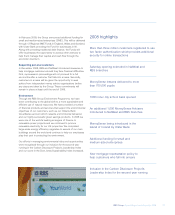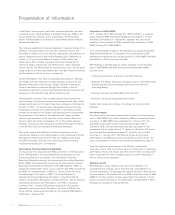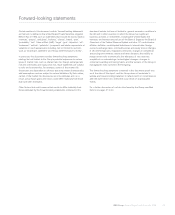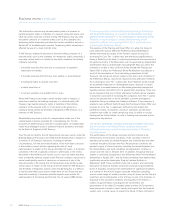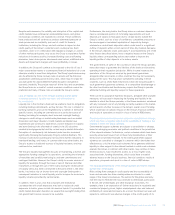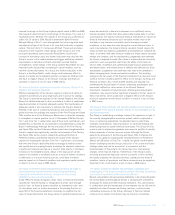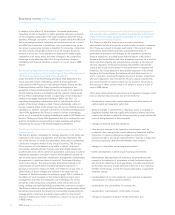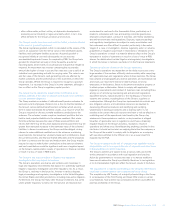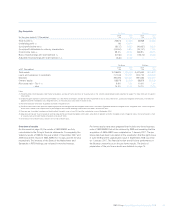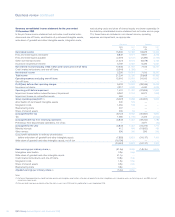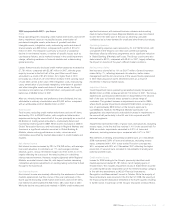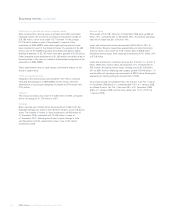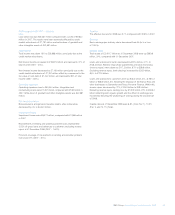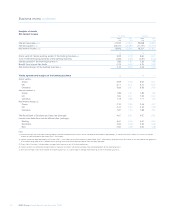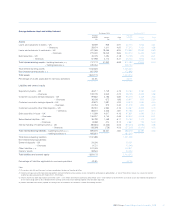RBS 2008 Annual Report Download - page 32
Download and view the complete annual report
Please find page 32 of the 2008 RBS annual report below. You can navigate through the pages in the report by either clicking on the pages listed below, or by using the keyword search tool below to find specific information within the annual report.
31RBS Group Annual Report and Accounts 2008
lowered its ratings on the Group’s hybrid capital issues to BB from BBB.
The long-term and short-term credit ratings of the Group of A+ and A-1
respectively were affirmed. The outlook of the Group was confirmed as
stable. On 20 January 2009, Moody’s lowered the Bank Financial
Strength Rating of B to C- and downgraded the senior long-term debt
and deposit ratings of the Group to A1 from Aa2, both with a negative
outlook. The short-term P-1 rating was affirmed. These and any future
reductions in the long-term credit ratings of the Group or one of its
principal subsidiaries (particularly the Royal Bank) could further
increase its borrowing costs. Any further reductions may also limit the
Group’s access to the capital markets and trigger additional collateral
requirements in derivative contracts and other secured funding
arrangements. Credit ratings of the Group and the Royal Bank are also
important to the Group when competing in certain markets, such as
over-the-counter derivatives. As a result, any further reductions in the
Group’s or the Royal Bank’s credit ratings could adversely affect its
access to liquidity and competitive position, increase its funding costs
and have a negative impact on the Group’s earnings and financial
condition or result in a loss of value in RBS shares.
The Group’s business performance could be adversely affected if its
capital is not managed effectively.
Effective management of the Group’s capital is critical to its ability to
operate its businesses, to grow organically and to pursue its strategy.
The Group is required by regulators in the United Kingdom, the United
States, the Netherlands and in other jurisdictions in which it undertakes
regulated activities, to maintain adequate capital. The maintenance of
adequate capital is also necessary to enhance the Group’s financial
flexibility in the face of continuing turbulence and uncertainty in the
global economy. Accordingly, the purpose of the First Placing and Open
Offer and the issue of the Preference Shares was to allow the company
to strengthen its capital position. As at 31 December 2008 the Group’s
Tier 1 and Core Tier 1 capital ratios were 9.9 per cent. and 6.6 per cent.
respectively, as reported on a proportional consolidated basis using the
Basel II methodology. Although the net proceeds of the First Placing
and Open Offer and the Preference Share Issue have strengthened the
Group’s capital base significantly, and the net proceeds of the Placing
and Open Offer will be used to redeem the existing £5 billion of
Preference Shares and thereby improve the quality of the Group’s
capital by increasing the Group’s Core Tier 1 capital ratio, any change
that limits the Group’s ability effectively to manage its balance sheet
and capital resources going forward (including, for example, reductions
in profits and retained earnings as a result of write-downs or otherwise,
increases in risk-weighted assets, delays in the disposal of certain
assets or the inability to syndicate loans as a result of market conditions
or otherwise) or to access funding sources, could have a material
adverse impact on its financial condition and regulatory capital position
or result in a loss of value in RBS shares.
The value of certain financial instruments recorded at fair value is
determined using financial models incorporating assumptions,
judgements and estimates that may change over time or may
ultimately not turn out to be accurate.
Under IFRS, the Group recognises at fair value: (i) financial instruments
classified as ‘held-for-trading’ or ‘designated as at fair value through
profit or loss’; (ii) financial assets classified as ‘available-for-sale’; and
(iii) derivatives, each as further described in ‘Accounting Policies’ on
page 182 of the financial statements. Generally, to establish the fair
value of these instruments, the Group relies on quoted market prices or,
where the market for a financial instrument is not sufficiently active,
internal valuation models that utilise observable market data. In certain
circumstances, the data for individual financial instruments or classes of
financial instruments utilised by such valuation models may not be
available or may become unavailable due to changes in market
conditions, as has been the case during the current financial crisis. In
such circumstances, the Group’s internal valuation models require the
Group to make assumptions, judgements and estimates to establish fair
value. In common with other financial institutions, these internal valuation
models are complex, and the assumptions, judgements and estimates
the Group is required to make often relate to matters that are inherently
uncertain, such as expected cash flows, the ability of borrowers to
service debt, residential and commercial property price appreciation
and depreciation, and relative levels of defaults and deficiencies. Such
assumptions, judgements and estimates may need to be updated to
reflect changing facts, trends and market conditions. The resulting
change in the fair values of the financial instruments has had and could
continue to have a material adverse effect on the Group’s earnings and
financial condition. Also, recent market volatility and illiquidity has
challenged the factual bases of certain underlying assumptions and
has made it difficult to value certain of the Group’s financial
instruments. Valuations in future periods, reflecting prevailing market
conditions, may result in further significant changes in the fair values of
these instruments, which could have a negative effect on the Group’s
results of operations and financial condition or result in a loss of value
in RBS shares.
The Group’s future earnings and financial condition in part depend on
the success of the Group’s strategic refocus on core strengths and its
disposal programme.
The Group is undertaking a strategic review of its operations in light of
the recently changed global economic outlook, which is expected to
focus on achieving appropriate risk-adjusted returns under these
changed circumstances, reducing reliance on wholesale funding and
lowering exposure to capital intensive businesses. The Group will also
continue with its disposal programme and review its portfolio to identify
further disposals of certain non-core assets. Although the Group
expects the proceeds of the Placing and Open Offer to improve the
quality of its capital by replacing the existing £5 billion of Preference
Shares with £5 billion of Core Tier 1 capital, the global credit markets
remain challenging and the Group’s execution of its current and future
strategic plans may not be successful. In connection with the
implementation of these plans, the Group may incur restructuring
charges, which may be material. Furthermore, if the Group’s plans,
including any planned disposals, are not successful or fail to achieve
the results expected, the Group’s business, capital position financial
condition, results of operations and future prospects may be negatively
impacted or this could result in a loss of value in RBS shares.
The Group operates in markets that are highly competitive and
consolidating. If the Group is unable to perform effectively, its business
and results of operations will be adversely affected.
Recent consolidation among banking institutions in the United Kingdom,
the United States and throughout Europe is changing the competitive
landscape for banks and other financial institutions. This consolidation,
in combination with the introduction of new entrants into the US and UK
markets from other European and Asian countries, could increase
competitive pressures on the Group. Moreover, if financial markets
continue to be volatile, more banks may be forced to consolidate.


